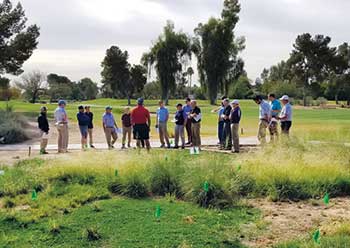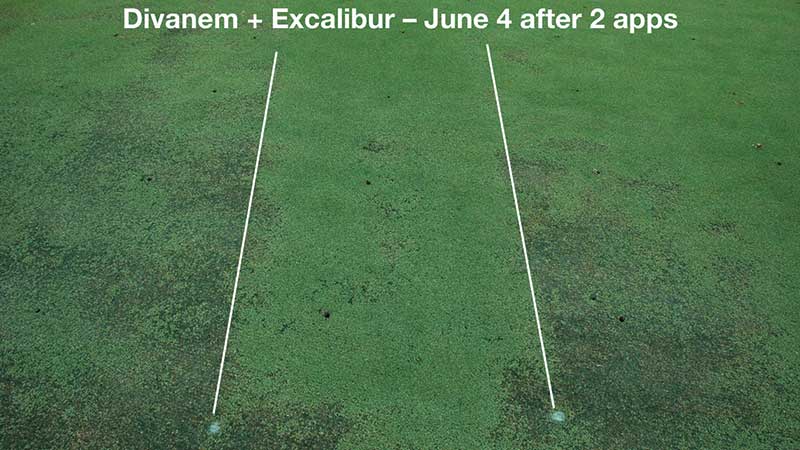Native grasses, groundcovers with turf removed

Native grasses and groundcovers at the University of Arizona Cooperative Extension demonstration field day at Camelback Golf Club, Paradise Valley, Ariz. (Photo By: Worku Burayu)
To reduce water use, golf courses are reducing turf in non-play areas by xeriscaping, or incorporating desert-adapted plants. There’s a need for salt-tolerant grasses and ornamental plants in the Southwest United States because of high-salinity soils and poor water quality. After turfgrass removal, expectations are for the aesthetic qualities of the site to be maintained or improved.
Native grass species alkali muhly (Muhlenbergia asperifolia), alkali sacaton (Sporobolus airoides), blue grama (Bouteloua gracilis), buffalograss (Buchloe dactyloides), big galleta (Hilaria rigida), plains lovegrass (Eragrostis intermedia), spike dropseed (S. contractus) and sand dropseed (S. cryptandrus) have a low water requirement and need few other inputs. A warm-season annual forage, Teff grass (Eragrostis tef) is gaining interest for pastures and as a hay crop. Kurapia [Lippia (Phyla) nodiflora], newly imported from Japan, is a sterile selection of L. nodiflora that was evaluated in California as a low-water-use groundcover. It has prolific flowering capacities and is attractive to honeybees and other pollinators.
We are determining germination, emergence and stand establishment and their water, nutrition and management requirements in the low desert. Experiments were initiated in spring 2015 at Camelback Golf Club in Paradise Valley, Ariz., with Kurapia plugs planted to evaluate preemergence and postemergence herbicides for safety. A second fall planting of Kurapia demonstrated that establishment during the cooler season was less aggressive than in spring. In the spring of 2016, the grasses and Kurapia were planted to evaluate their performance. The same grasses and Kurapia were planted again in 2017 at Briarwood Country Club in Sun City, Ariz. Plains lovegrass, alkali sacaton, alkali muhly, blue grama and Kurapia remained green and attractive throughout the year.
Kai Umeda is the Extension agent, turfgrass science at University of Arizona Cooperative Extension, Phoenix, Ariz. You may reach Kai at kumeda@cals.arizona.edu for more information.










